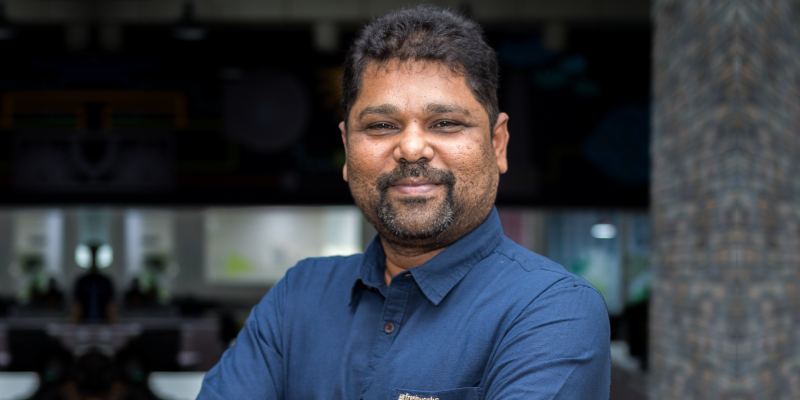Freshworks is a name that is often synonymous with the subjects of customer empathy and compelling storytelling. But its founder Girish Mathrubootham sometimes has a greater role to play in intersection of customer empathy and storytelling more the company itself.
The Founder and CEO started his career at HCL-Cisco ODC by training customers.
He understood the importance of User Interface, how the labels should read, how obvious the call-to-action buttons should be — all without the customers thinking too much before navigating through their screens.
When customer trainers talk about products, it is largely around features. But all that goes in a customer’s mind is their own problems. It is an important gap to bridge.
“Thinking of features specifically took a backseat but thinking about customer problems took top priority. The ability to think like a user on a fundamental level is what makes great product managers. As a founder or product manager, you should be willing to work harder to make the life of a customer easier,” he says.
During the early days of building any startup, a founder cannot afford to hire someone from an Ivy League school or a great company.
- Founders would have to make do with the best that they can get at that point of time, which is the reality.
- Alternatively, it is ideal that the founder comes with their own network, to be able to hire from alma mater or friends of friends.
- One book that changed Girish’s attitude towards hiring was ‘First Break All The Rules’ by Markus Buckingham. It talked about the basic difference between skills, knowledge, and talent. Skills are what can be taught. Knowledge can be factual and experiential, the former can be taught while the latter can be through an experience.
- When it comes to talent, the parameters Girish looks at is, if the candidates are analytical thinkers or logical thinkers, how creative and organised are they? Are they passionate from their heart or do they listen to what their mind says? Are they natural talkers and enjoyable to engage with?
“There are two ways to go about it. One is to hire an existing candidate that comes from an Ivy League background, or pick out a talented candidate and help mould him/her into a shining diamond eventually. There is a great level of joy in doing the latter, though it is harder work than the former,” he says.
Those who have had excellent schooling with English, who are natural readers and creative writers would do very well in Marketing. To check for customer empathy, Freshworks would ask its potential candidates to write a customer reply in case of a failed transaction, and the customer is stuck.
The company sees that a candidate has a certain scale of detail orientation, showing promise towards customer empathy and how much they are willing to own the customer’s problems.
With criteria like, how well the salespeople can talk naturally, and how well the pre-sales people can think on their feet, and so on, Freshworks got around to building its own framework to hire the right set of talent and mould them over the years.
Being an average student who had to pick up his learnings on-the-go, while a lot of things went right for him, Girish says that is how his belief was shaped around finding the rough diamonds in the market that he could possibly shape into shine.

Freshworks CEO Girish Mathrubootham
The decision-making model
As a founder, you are supposed to make decisions day-in and day-out, some impact less and others more. More importantly, these are the decisions that the founders are going to have to stick with.
Many of Girish’s best friends often tell him that he is someone who keeps doing whatever makes him happy. He agrees with a certain comment made by a friend’s father that Girish constantly lives in the moment and doesn’t look too ahead to the future.
“I follow my heart rather than listening to my mind all the time,” he quips.
- Girish’s first placement offer after college in 1998 paid him Rs 12,000 a month. He had to sell industrial consumables like alloys and soldering materials that are sold to factories.
- A bunch of his friends were already finding jobs in IT, and Girish did not really like what he was selling in his job. It was time when the Y2K boom was in full swing, and his friends were already collecting larger paychecks in their jobs.
- Wanting to be in a fast growing ‘Sunrise’ industry of companies in IT where he could have fun, he took up an IT for far lesser salary of Rs 5,000 a month. Besides, there was a surge of layoffs after the dotcom bubble burst, and the environment was negative enough to work at.
- With a pull towards optimising for happiness, Girish started to pick up this trait in 1998 itself. Money did not matter much but it was important for him to find happiness wherever he went, in a positive environment.
Though he was stubborn enough to not listen to anyone’s advice in the early days of his career, Girish is now a matured listener who keeps everything in context before making any decision.
But the key element has always been around optimising for happiness and enjoying what he does, over the years. He says this approach has largely influenced his decision-making framework.
“When it comes to building a company, business is all about a repeated mechanism of doing something that really works. For Freshworks, it was the inbound playbook model for building in the B2B SaaS industry. It was very repeatable,” Girish adds.
Girish and Shan decided early-on that this playbook is going to be a constant. The company was really strong on the inbound playbook, and Girish’s understanding of the buyer who comes online was really high. As a result, the aspects of product marketing, demand generation, optimising for speed and velocity, redirection to sign-up, overall web design, how intuitive the UI should be, were very organised.
- Freshworks had only one employee for support and one for pre-sales, and it already had around customers by May 2012.
- When recommended that they move to the US and garner more users, Girish was adamant that he stayed back in India and built more on what was already working out for the business.
- In 2012-13, Freshworks was building a new product called Fresh Marketer. Freshdesk, the support product, was not even touching a million dollars in revenue.
- The competition would throw statements that Freshworks was pivoting to Marketing and they were failing in support.
- Upon the advice from his board members and with the fear of confusing the market with the new product offering, he shut down Fresh Marketer.
However, being adamant on proving his hypothesis that his inbound playbook model was a success formula, he wanted to try it out again. Girish replicated the same inbound playbook in Helpdesk for internal employee support, and it was also working out for his users.
This was an experiment to prove that his hypothesis really shows results and it works, with the new marketing products generating $1.5 million ARR in the first year and $6.5 million ARR in the second. Towards the end, Shekhar Kirani, Accel Partner and board member ended up asking Girish a plan around all the SaaS apps he could build with the inbound playbook framework he replicated for Helpdesk.
“More and more people only learn during the first 20 years of education in school and college. But my real learning started only after I turned 20. Making up for all the learning I did not have in the first 20 years of my life, I think I am now learning with a vengeance,” he says.
Anand Daniel is a seed/early-stage venture investor with Accel Partners.
Edited by Kanishk Singh
(Disclaimer: The views and opinions expressed in this article are those of the author and do not necessarily reflect the views of YourStory.)
Link : https://yourstory.com/2020/11/podcast-freshworks-girish-mathrubootham-saas-accel
Author :- Anand Daniel ( )
November 22, 2020 at 06:10AM
YourStory

